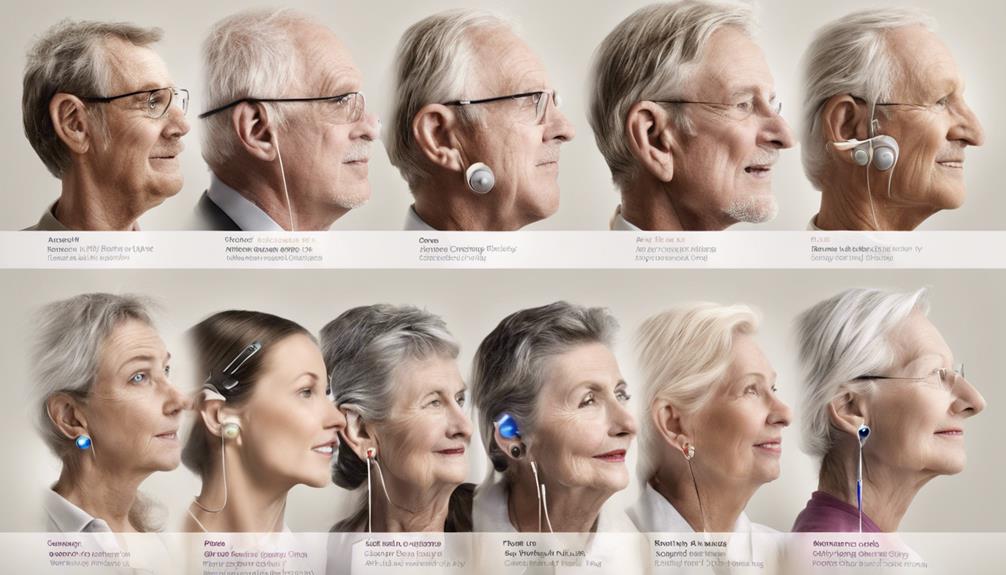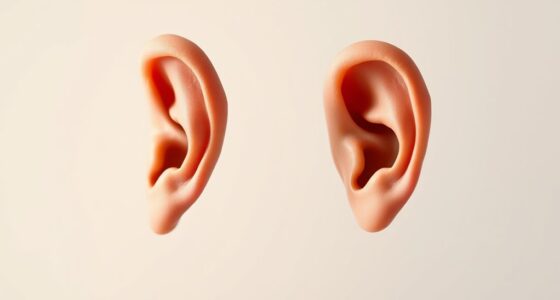In the intricate dance of our senses, it may come as a surprise to discover that a decrease in hearing ability can have a major impact on our balance.
The delicate interplay between auditory input and equilibrium is a fascinating subject that sheds light on how hearing loss can lead to balance problems.
Let's explore the intricate mechanisms that connect these seemingly unrelated functions and uncover the surprising ways in which our ears shape our ability to stay steady on our feet.
Key Takeaways
- Hearing loss disrupts spatial processing crucial for balance stability.
- Cognitive overload from compensating for hearing loss impairs balance mechanisms.
- Changes in movement patterns due to hearing loss increase the risk of falls.
- Understanding the intricate relationship between hearing loss and balance is essential for managing fall risk.
The Impact of Hearing Loss on Equilibrium
The disruption in the brain's balance processing caused by hearing loss can result in vertigo, dizziness, and unsteadiness. Hearing loss affects the equilibrium by reducing auditory input crucial for spatial processing. This deficiency in sensory information can lead to balance instability as the brain struggles to interpret spatial cues accurately. Additionally, the cognitive load imposed by compensating for hearing loss can overwhelm the brain, impairing its ability to process sensory inputs necessary for maintaining balance effectively. Changes in movement patterns associated with hearing loss further compound the issue, disrupting overall equilibrium and increasing the risk of falls.
Studies have shown a correlation between hearing loss and alterations in gait and posture, indicating a direct impact on equilibrium. The interplay between the sensory systems, spatial processing, and movement patterns underscores the intricate relationship between hearing loss and balance. Understanding these connections is crucial for addressing balance issues in individuals with hearing impairments and developing targeted interventions to improve their quality of life.
Understanding the Balance-Hearing Connection

In understanding the connection between balance and hearing, spatial processing plays a pivotal role in maintaining equilibrium and preventing balance-related issues. Hearing loss can disrupt the intricate mechanisms involved in spatial processing, leading to challenges in interpreting the body's position in relation to its surroundings.
This disruption can result in cognitive overload, where the brain struggles to process sensory information essential for balance. Studies have indicated that individuals with hearing loss may experience gait alterations and postural instability, further underscoring the link between auditory input and movement coordination.
The compromised sensory processing stemming from hearing loss can also affect movement patterns, increasing the risk of falls. Addressing hearing loss is imperative not only for improving auditory function but also for mitigating gait-related balance problems and reducing the likelihood of falls.
Understanding how hearing loss impacts spatial processing and sensory integration is crucial in managing balance issues and promoting overall well-being.
Symptoms of Hearing Loss and Imbalance
How do hearing loss and imbalance manifest through specific symptoms?
Hearing loss can present with symptoms such as vertigo, lightheadedness, and spatial disorientation. Vertigo, characterized by a spinning sensation, nausea, and abnormal eye movements, is a common symptom associated with hearing loss.
Individuals with hearing loss often experience fatigue due to the increased brain effort required to process sounds correctly, leading to a feeling of tiredness and mental exhaustion.
Moreover, hearing loss is linked to an elevated risk of falling, particularly in older adults, due to the compromised ability to perceive environmental cues accurately.
Tinnitus, another prevalent symptom of hearing loss, manifests as the perception of noises in the ears or head, further contributing to the challenges faced by individuals with hearing impairment.
Understanding these symptoms is crucial in identifying hearing loss-related imbalance issues and addressing them effectively to improve quality of life and reduce the associated risks.
Conditions Linked to Hearing Loss and Balance

Linked to hearing loss and balance are various conditions that can significantly impact an individual's vertigo and spatial orientation. Conditions such as Labyrinthitis and Meniere's disease affect both hearing and balance, leading to symptoms like vertigo and dizziness. While not all individuals with balance disorders experience hearing loss, there is a complex relationship between the two. Common balance disorders like Benign Paroxysmal Positional Vertigo (BPPV), vestibular neuronitis, Mal de Debarquement Syndrome (MdDS), and perilymph fistula can all influence balance and spatial orientation. Treatment approaches vary depending on the underlying cause, ranging from antibiotics for infections to medications for conditions like Meniere's disease. Vestibular Rehabilitation Therapy (VRT) plays a crucial role in desensitizing the balance system, effectively reducing falls and episodes of vertigo in individuals with balance issues.
| Condition | Description | Impact |
|---|---|---|
| Labyrinthitis | Inner ear inflammation affecting hearing and balance, leading to vertigo and nausea. | Disrupts spatial orientation and coordination. |
| Meniere's Disease | Chronic condition of the inner ear causing vertigo, hearing loss, and ringing in the ears. | Affects both balance and auditory functions. |
| BPPV | Brief episodes of vertigo triggered by certain head movements, due to inner ear issues. | Sudden dizziness impacting balance control. |
Research on Hearing Loss and Balance Challenges
Research findings have revealed a strong association between hearing loss and challenges in maintaining balance stability, highlighting the critical link between auditory function and spatial orientation. Reduced auditory input, a consequence of hearing loss, significantly impacts spatial processing, which is essential for maintaining balance. Furthermore, cognitive overload resulting from efforts to compensate for impaired hearing can overwhelm the brain, leading to difficulties in processing sensory information crucial for balance maintenance.
- Hearing Loss affects Auditory Input and Spatial Processing
- Cognitive Overload from hearing loss can hinder Balance Mechanism
- Addressing hearing loss is crucial in managing Falls Risk and Gait-related Balance challenges.
Understanding the intricate relationship between hearing loss and balance is essential in addressing the root causes of balance issues and reducing the risk of falls. The inner ear plays a crucial role in providing the brain with necessary information for maintaining stability, emphasizing the interconnectedness of sensory systems in the overall balance mechanism.
Frequently Asked Questions
Can Losing Your Hearing Affect Your Balance?
Yes, losing our hearing can indeed affect our balance. Deficiencies in auditory input can disrupt spatial processing, hindering our ability to integrate sensory information critical for maintaining stability.
This disruption, stemming from cognitive overload caused by hearing loss, can impair the brain's processing of balance-related cues. Reduced auditory stimuli can lead to instability in posture and gait, increasing the risk of falls.
Addressing hearing loss is crucial in managing these balance issues and enhancing overall stability.
How Can Hearing Loss Impact Daily Function?
Hearing loss can significantly impact daily function by affecting communication, social interactions, and cognitive abilities. It may lead to feelings of isolation, frustration, and difficulty in understanding conversations.
Additionally, hearing impairment can interfere with work performance, educational pursuits, and overall quality of life. Seeking appropriate interventions, such as hearing aids or assistive devices, can greatly enhance our ability to engage fully in daily activities and maintain optimal functioning.
Is There a Connection Between Hearing Loss and Vertigo?
Yes, there's a strong connection between hearing loss and vertigo. Inner ear issues related to hearing loss can lead to vertigo symptoms.
Conditions like Meniere's disease, which affect both hearing and balance, can cause severe vertigo. The inner ear labyrinth, vital for balance, can be impacted by hearing loss, contributing to vertigo episodes.
Understanding this link is crucial for accurate diagnosis and effective treatment of both hearing and balance issues.
How Does Sound Affect Balance?
Sound plays a critical role in maintaining balance by aiding spatial processing. Our brains rely on auditory input to accurately perceive body position. When hearing is compromised, spatial awareness can be disrupted, leading to balance issues.
Reduced auditory input impacts the brain's processing of balance information. Studies have shown a correlation between hearing loss and instability in balance control. Understanding how sound influences balance is essential for maintaining stability and preventing falls.
Conclusion
In conclusion, the intricate relationship between hearing loss and balance problems can't be overstated. Like a delicate dance between our senses, any disruption in auditory input can throw off our equilibrium.
As researchers continue to delve into this connection, it's crucial for individuals experiencing hearing loss to seek proper treatment to mitigate the risk of balance-related complications. Remember, our ears not only help us hear, but also play a crucial role in keeping us steady on our feet.











